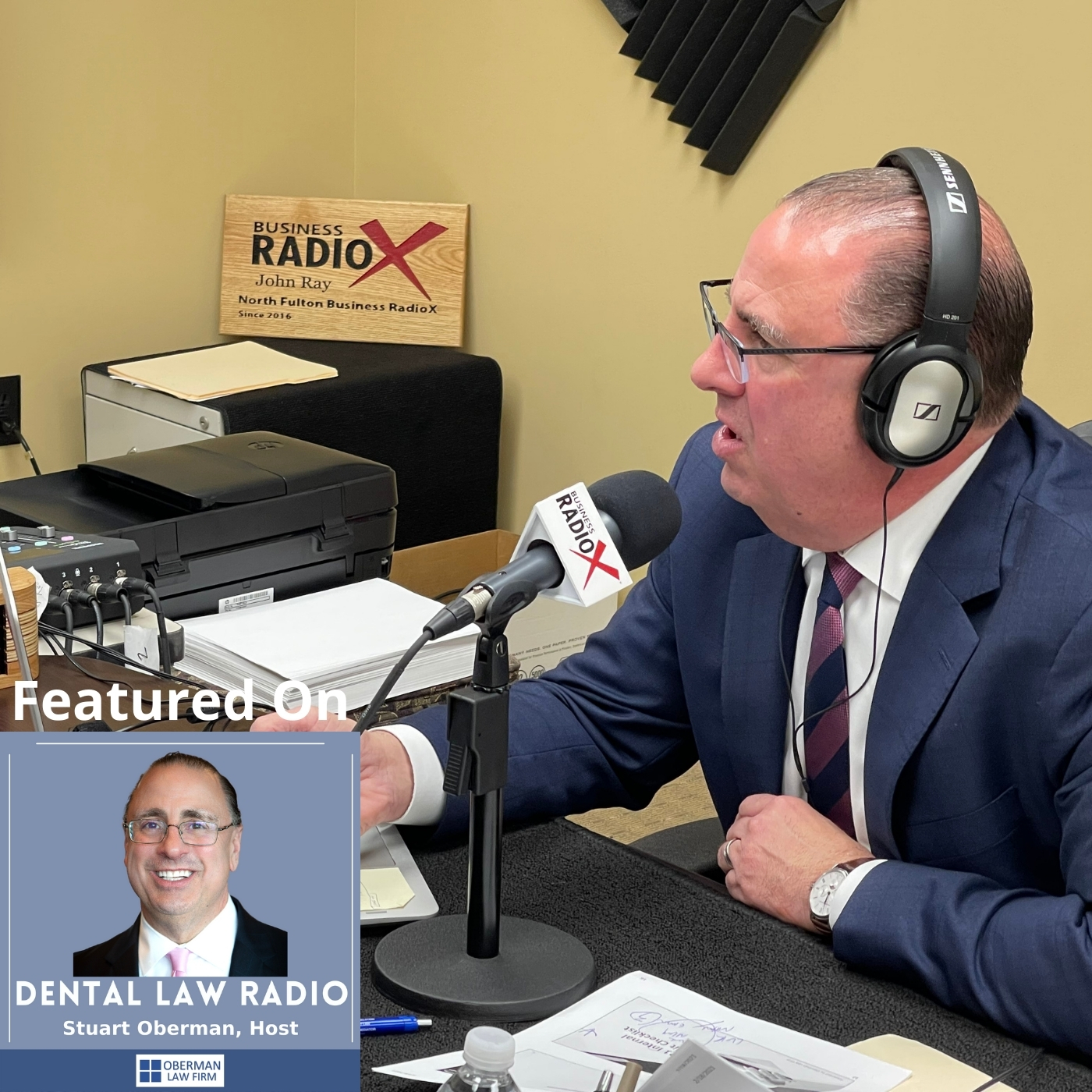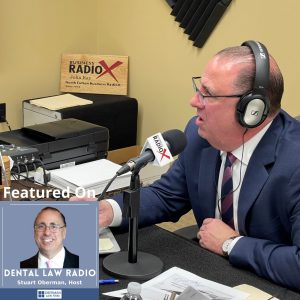

Employer Job Interviews and Covid-19 Questions (Dental Law Radio, Episode 18)
The hot question for dental practices seeking to hire is whether they can ask candidates about their vaccination status. The issue goes deeper than just a simple yes or no. As Stuart Oberman explains in this episode, he finds that HR is the biggest nightmare for dental practices, and that sloppy employer practices and documentation produce sweeping violations which go well beyond just one question in an interview. Dental Law Radio is underwritten and presented by Oberman Law Firm and produced by the North Fulton studio of Business RadioX®.
TRANSCRIPT
Intro: [00:00:01] Broadcasting from the Business RadioX studios in Atlanta, it’s time for Dental Law Radio. Dental Law Radio is brought to you by Oberman Law Firm, a leading dental-centric law firm serving dental clients on a local, regional and national basis. Now, here’s your host, Stuart Oberman.
Stuart Oberman: [00:00:26] Hello, ladies and gentlemen. And welcome to Dental Law Radio. Our previous segments have dealt specifically with COVID-19. We’re going to conclude this series with what happens regarding interviews. So, if we digress a little bit on our first segments, we went through complex governmental matters, employee resistance, mandates.
Stuart Oberman: [00:00:55] Now, what we’re seeing is that in this job market, we’re seeing a lot of turnover in our dental practices and, actually, across the board on our nondental clients. So, we’re getting a lot of questions. Again, this particular topic, employer job interviews, COVID-19 questions, that’s a whole another day – that’s a whole another day that we could speak about for another eight hours. But one thing that we want to do, we just want to touch on some pros and cons, some yes and nos, things you can and can’t do on interviews. Because I will tell you, in today’s world, if you think that the potential employees are not recording your conversations, your job interviews, you have another thing coming. I will assure you. And also, nowadays, we’re doing Zoom interviews, and we’re hiring people without even shaking the hands and kissing the babies. So, then, what do you do? Now, you’re on Zoom. And you don’t even know you’re being recorded on Zoom.
Stuart Oberman: [00:02:09] So, what happens is, is that, now, someone who’s not experienced in your office, it could be a wide variety of positions that do your “hiring and firing,” that are not HR-trained, that either have been the old front desk; or, now, we’ve got the hygienist who’s now interviewing; and now, we got the office manager who used to answer the phones three weeks ago, now, they’re doing the interviews. So, you’ve just opened up the door to huge potential problems if you do not – and I repeat – if you do not understand what you can and cannot do.
Stuart Oberman: [00:02:55] So, very, very succinctly. So, we get these questions, “Can I require vaccinations?” and tell people who I’m hiring, “You are now required to get a vaccination the first day”? The answer is yes. Now, that guidance is constantly changing. Last year when we started all this, COVID-19, the overall prevailing view was no because there is too much risk. Now, we’re seeing mandates on top of mandates, on top of mandates from employers. So, if you have procedures in place, if you have dotted all of your Is and crossed your Ts regarding compliance with the Americans with Disabilities Act, EEOC, the CDC, OSHA, EEO and the FDA, then, yes, there’s probably a pretty good likelihood that you will be able to require that new hires be vaccinated, but you can’t do it arbitrarily.
Stuart Oberman: [00:04:02] Now, I will say this that guidance from the ADA and EEOC, in many cases, is unsettled. So, the guidance today is yes, we can mandate, but we have to have very, very stringent federal law, state law, local law compliance on these policies. So, then, what happened is, is that let’s say you mandate that your hire does not want to get a vaccination. So, now, you’re in a couple areas. You’re in the ADA, American with Disabilities Act, EEOC because you love this new employee, this employee-to-be. So, you have to indicate that you’ve got an accommodation. medically and disability and religiously for that person because they do not and cannot get vaccinated for a wide variety of reasons.
Stuart Oberman: [00:05:12] Now, I will tell you, the sloppiest thing our dental practices do is try to maintain HR. HR is a nightmare for our dental practices. And I’ll say our employer clients, in general. So, one thing you cannot do is that you cannot intermingle the vaccination exemptions, protocols or compliance into the employer’s regular personnel file. These have to be treated as separate confidential medical records.
Stuart Oberman: [00:05:55] Now, we’ve had cases where the employers have literally given over the employee files to them to manage. That is literally like putting the fox in the henhouse. You cannot give your employees their own personnel files to manage, because I will guarantee you, if that employee is fired, leaves, discharged, that record is gone. And then, you’re going to ask me for advice. And I would say, “Where’s your file?” Are you going to say, “I don’t have it.” And I’m going to say, “Where is it at?” And then, you’re going to say, “The employee had it.” I’m going to say, “Great. At least, you had one but, now, we’re in a whole different ballgame.”
Stuart Oberman: [00:06:40] So, on the mandates, the EEOC provides guidance that employers may lawfully — a vaccination policies, even for those that are just starting. Now, the key is that’s a lot of variance there, that’s a lot of governmental guidance agency-wise. So, you have to constantly keep track of what’s going on with all these agencies. Again, I know I keep saying it, OSHA, CDC, EEOC, EO, FDA, all those will change guidance in a heartbeat, and you’ve got to keep track of that, and you have to adjust your written policies – and notice I said written policies – either way. You’ve got to stay on top of this. And honestly, you can’t leave it to one person in your office, HR to cover this. You can’t leave it to payroll. Half the time you’re lucky if you get your payroll correct from payroll companies; nevertheless, handled to HR on a complicated matter like this.
Stuart Oberman: [00:07:42] So, again, I will stress, stay on top of this. Stay on top of this. Seek counsel if you have any questions, concerns whatsoever. If you want to reach out to us, please feel free to email me directly at stuart@obermanlaw.com. We try to provide as much guidance as we can. You could get added to our newsletter. We try to put out publications as much as possible, at least a couple of times a month, on these kinds of issues, related to vaccination issues. We’ll be doing a lot of industry webinars and some live events. So, the resources are out there. Use them because this is an extremely difficult trap for the unwary.
Stuart Oberman: [00:08:37] So, that is really going to conclude our multipart segment on COVID-19, really for now, until the government issues additional guidance. Then, we’re going to have to, obviously, modify some things. So, let’s jump with thank you for joining us. It has been a pleasure. If you have any questions, concerns, please feel free to reach out to us. And have a great day. And we look forward to having you join us on subsequent Dental Law Radio podcasts. Have a great day.
About Dental Law Radio
Hosted by Stuart Oberman, a nationally recognized authority in dental law, Dental Law Radio covers legal, business, and other operating issues and topics of vital concern to dentists and dental practice owners. The show is produced by the North Fulton studio of Business RadioX® and can be found on all the major podcast apps. The complete show archive is here.
Stuart Oberman, Oberman Law Firm

Stuart Oberman is the founder and President of Oberman Law Firm. Mr. Oberman graduated from Urbana University and received his law degree from John Marshall Law School. Mr. Oberman has been practicing law for over 25 years, and before going into private practice, Mr. Oberman was in-house counsel for a Fortune 500 Company. Mr. Oberman is widely regarded as the go-to attorney in the area of Dental Law, which includes DSO formation, corporate business structures, mergers and acquisitions, regulatory compliance, advertising regulations, HIPAA, Compliance, and employment law regulations that affect dental practices.
In addition, Mr. Oberman’s expertise in the health care industry includes advising clients in the complex regulatory landscape as it relates to telehealth and telemedicine, including compliance of corporate structures, third-party reimbursement, contract negotiations, technology, health care fraud and abuse law (Anti-Kickback Statute and the State Law), professional liability risk management, federal and state regulations.
As the long-term care industry evolves, Mr. Oberman has the knowledge and experience to guide clients in the long-term care sector with respect to corporate and regulatory matters, assisted living facilities, continuing care retirement communities (CCRCs). In addition, Mr. Oberman’s practice also focuses on health care facility acquisitions and other changes of ownership, as well as related licensure and Medicare/Medicaid certification matters, CCRC registrations, long-term care/skilled nursing facility management, operating agreements, assisted living licensure matters, and health care joint ventures.
In addition to his expertise in the health care industry, Mr. Oberman has a nationwide practice that focuses on all facets of contractual disputes, including corporate governance, fiduciary duty, trade secrets, unfair competition, covenants not to compete, trademark and copyright infringement, fraud, and deceptive trade practices, and other business-related matters. Mr. Oberman also represents clients throughout the United States in a wide range of practice areas, including mergers & acquisitions, partnership agreements, commercial real estate, entity formation, employment law, commercial leasing, intellectual property, and HIPAA/OSHA compliance.
Mr. Oberman is a national lecturer and has published articles in the U.S. and Canada.
Oberman Law Firm
Oberman Law Firm has a long history of civic service, noted national, regional, and local clients, and stands among the Southeast’s eminent and fast-growing full-service law firms. Oberman Law Firm’s areas of practice include Business Planning, Commercial & Technology Transactions, Corporate, Employment & Labor, Estate Planning, Health Care, Intellectual Property, Litigation, Privacy & Data Security, and Real Estate.
By meeting their client’s goals and becoming a trusted partner and advocate for our clients, their attorneys are recognized as legal go-getters who provide value-added service. Their attorneys understand that in a rapidly changing legal market, clients have new expectations, constantly evolving choices, and operate in an environment of heightened reputational and commercial risk.
Oberman Law Firm’s strength is its ability to solve complex legal problems by collaborating across borders and practice areas.
Connect with Oberman Law Firm:
Company website | LinkedIn | Twitter















